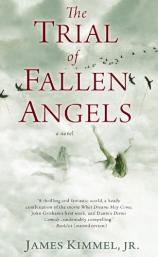The Trial of Fallen Angels
Review
The Trial of Fallen Angels
The transition between living and dead isn’t an easy one. And for victims of violence, it may be even more difficult. Thirty-year-old Brek Abigail Cuttler’s death was undoubtedly violent, judging from the amount of blood staining her clothes and oozing from her body when she arrives at Shemaya Station, a place akin to what we call Purgatory. It is here that Brek has her first awareness after dying. She can’t recall what happened to her, only that she had picked up her infant daughter Sarah from daycare and was very happy to be heading home. She loved her life with her child and her husband Bo, a television news reporter. And now she doesn’t know why she’s here.
How did she die? That’s the biggest question on Brek’s mind once she accepts the fact that she has died. During her lifetime, Brek had been a champion of justice, beginning when she was a child and held a mock trial of some boys who mindlessly slaughtered crawfish. It was natural, then, that she would become a lawyer. Here in Shemaya, she is told she will be a presenter, similar to a defense attorney, only without the arguments. Souls are presented in the Courtroom for determination of where they will spend eternity. Brek sits beside her mentor through several trials and finds herself more confused than ever. The courts in which she appeared before in life worked very differently. But it appears that the rules governing earthly laws don’t apply here.
"Treasure this book, for it is one you will want to read over and over again and always will be rewarded with the discovery of a new revelation."
Even as she begins to adjust to her new reality, she stumbles under the weight of more questions. Why do the scales seem to be tipped so unjustly? Is the judicial system in the Hereafter broken as badly as it is on Earth? Maybe Brek has been sent here to fix it. Or maybe it goes deeper than that. Can it be a question of whether it’s justice that we really want, or have we confused justice with righteousness?
Learning how to cope with one’s death cannot be easy, and Brek starts to understand why. The events of her final moments trickle back to her with horrifying clarity. No wonder she suppressed the memories. Can she ever forgive? She must, or she may remain in limbo forever. How could God have let this happen?
“…perhaps the story is told not so we understand the condition of man, which we know all too well. Perhaps it is told so we understand the condition of God.”
James Kimmel, Jr. explores the unique idea of God’s need for mankind, a need that may be far stronger than mankind’s need for God. That, by itself, is an exceptionally intriguing concept. But taken a step further, pondering God making choices --- like punishing humankind with the Great Flood --- that He then regrets opens a whole new and thought-provoking dimension. Heady stuff, indeed. It comes down to choices. And here, much of what happens to Brek has to do with the choices she makes and the choices that the people with whom she interacts make.
Treasure this book, for it is one you will want to read over and over again and always will be rewarded with the discovery of a new revelation. Deeply temporal, THE TRIAL OF FALLEN ANGELS contains a spectacular world of theology, philosophy and, yes, mystery. Its spiritual side beautifully balances the suspense side, in keeping with the lesson of a yin for every yang.
What will earn this novel endless praise, too, is the astonishing fact that it is Kimmel’s first book. He writes exquisite prose in the voice of a female character with stunning accuracy, and is a master at eliciting a wealth of emotion from his readers. What an incredible debut. Where will Kimmel go next? I can hardly wait.
Reviewed by Kate Ayers on December 14, 2012





